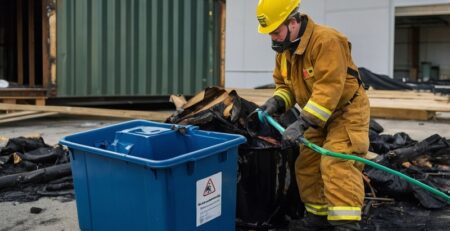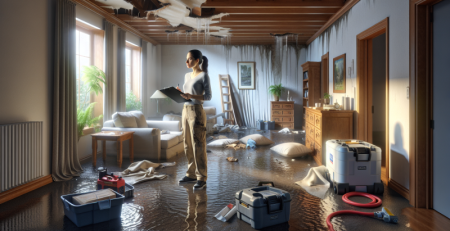The Impact of Water Damage on Home Value
**The Impact of Water Damage on Home Value** is a critical topic for homeowners and property managers alike. Have you ever considered how water damage can affect the value of your home? Understanding the implications of water damage is essential, as it can lead to significant financial losses and a decrease in property value if not addressed promptly.
Water damage can reduce a home’s market value by as much as 25% or more, depending on the severity and extent of the damage. Issues such as mold growth, structural damage, and the need for extensive repairs can deter potential buyers and lead to costly renovations. Experts agree that timely restoration is crucial to mitigate these impacts and preserve property value.
But the consequences of water damage extend beyond mere financial loss. They can affect your home’s livability and safety, making it vital to act quickly. So, let’s delve deeper into the factors influencing home value after water damage and explore how professional restoration services, like those offered by Kraus Restoration, can help you recover and protect your investment.
Understanding Water Damage
Water damage refers to the destruction caused by water intrusion, which can manifest in various forms. Common types include flooding, leaks, and mold growth. Each of these issues can significantly impact a home’s integrity and value. For instance, flooding often results from severe weather events, while leaks may stem from aging plumbing systems. Additionally, mold can develop in damp areas, posing health risks and further complicating repairs.
Several factors contribute to water damage in homes. Heavy rainfall, snowmelt, and hurricanes can lead to flooding. On the other hand, plumbing issues, such as burst pipes or faulty appliances, frequently cause leaks. These problems can escalate quickly, leading to extensive damage if not addressed promptly.
The immediate effects of water damage are often severe. Homeowners may notice warped floors, stained walls, or a musty odor. These signs indicate that water has infiltrated the structure, potentially leading to costly repairs. To mitigate these risks, it’s crucial to act swiftly. For more information on how to handle these situations, visit our water cleanup and mold cleanup services.
Types of Water Damage
Water damage can be categorized into three distinct types: clean water, gray water, and black water. Clean water originates from sources like broken pipes or rainwater. While it poses minimal health risks, prompt action is essential to prevent further issues. Gray water, which comes from appliances like dishwashers or washing machines, contains contaminants that can affect health if not addressed quickly. Lastly, black water is highly contaminated, often resulting from sewage or flooding. This type poses significant health risks and requires immediate professional intervention.
The type of water damage directly influences the restoration process and associated costs. For instance, clean water damage may require simple drying techniques, making it less expensive to restore. In contrast, gray water damage necessitates more extensive cleaning and sanitization, increasing costs. Black water damage demands thorough decontamination and often involves replacing affected materials, leading to the highest expenses. Understanding these distinctions is crucial for homeowners facing water damage. For more information on our services, or to learn about our company, feel free to reach out.
Short-Term Effects of Water Damage on Home Value
Water damage can significantly reduce a home’s value almost immediately. When potential buyers see signs of water damage, they often perceive the property as a risk. This perception can lead to lower offers or even deter buyers altogether. In fact, homes with visible water damage can lose up to 25% of their market value.
Moreover, the psychological impact on buyers cannot be underestimated. Many buyers associate water damage with ongoing issues, such as mold or structural problems. Consequently, this fear can create a negative impression, further driving down the home’s appeal. A study found that properties with a history of water damage sold for 15% less than similar homes without such issues.
Additionally, the market perception shifts dramatically. Buyers tend to gravitate towards homes that appear well-maintained. Therefore, if water damage is evident, it can lead to prolonged market time and increased carrying costs for sellers. To mitigate these effects, homeowners should consider professional water cleanup services. Addressing the damage promptly can help restore value and improve buyer confidence.
Long-Term Consequences of Water Damage
Unresolved water damage can silently undermine a home’s structural integrity. Over time, weakened beams and compromised foundations may lead to significant safety hazards. Consequently, homeowners face escalating repair costs as the damage worsens. Moreover, water damage creates an ideal environment for mold growth. Mold not only poses serious health risks but also diminishes property value. Potential buyers often shy away from homes with a history of mold issues, fearing hidden problems.
As the damage persists, the marketability of the property declines. Homes with long-term water damage may linger on the market, leading to reduced offers. Additionally, the financial burden of extensive repairs can strain homeowners. Investing in water cleanup services early on can mitigate these risks. Addressing issues promptly not only preserves the home’s value but also ensures a safe living environment. Ultimately, neglecting water damage can have lasting repercussions, affecting both health and financial stability. For more information on how to protect your home, visit our about page or explore our services.
The Restoration Process
The restoration process begins with a thorough assessment of the water damage. Professionals identify the source of the water and evaluate the extent of the damage. Next, they initiate the drying process using specialized equipment. This step is crucial, as lingering moisture can lead to mold growth and further deterioration.
After drying, repairs commence. This may involve replacing damaged flooring, drywall, or insulation. While some homeowners consider DIY approaches, professional restoration services offer expertise that can prevent costly mistakes. Moreover, professionals can access advanced tools and techniques that ensure a comprehensive restoration.
Costs associated with water damage restoration can vary significantly. Factors such as the extent of the damage and the materials needed play a role. Unfortunately, inadequate restoration can lead to decreased home value. Therefore, investing in professional services is often more cost-effective in the long run. Homeowners should also consider the potential impact on their property’s marketability. Ultimately, addressing water damage promptly and effectively is essential for maintaining home value. For more information, visit our about page or explore our services.
Insurance and Water Damage
Homeowners insurance often provides coverage for water damage, but the specifics can vary widely. Typically, policies cover sudden and accidental incidents, such as burst pipes or severe storms. However, understanding the nuances of your policy is crucial. For instance, some plans may exclude damage from flooding or lack of maintenance. Therefore, reviewing your policy details ensures you know what is covered.
Filing claims promptly is essential. Delays can lead to complications or even denial of coverage. When you file a claim, it’s vital to document the damage thoroughly. This documentation supports your case and helps expedite the claims process.
Moreover, insurance claims can significantly impact your home’s value. A history of water damage claims may raise concerns for potential buyers. They might perceive the property as a risk, leading to lower offers. Additionally, frequent claims can affect your future insurability, making it harder to secure coverage. To safeguard your investment, consider consulting with professionals. For more information on how to protect your home, visit water cleanup or mold cleanup.
Preventative Measures and Maintenance
Preventing water damage requires proactive measures and consistent maintenance. Homeowners should conduct regular inspections of roofs, gutters, and downspouts. This practice helps identify potential issues before they escalate. Additionally, ensure proper drainage around the foundation. This step minimizes the risk of water pooling and infiltrating your home.
Maintaining plumbing systems and appliances is crucial. Regularly check for leaks and replace worn-out hoses in washing machines and dishwashers. These small actions can save you from significant damage later. Furthermore, consider scheduling professional plumbing inspections annually. This can help catch hidden problems early.
Landscaping plays a vital role in preventing water intrusion. Ensure that plants and trees are positioned away from the foundation. This prevents roots from damaging underground pipes. Moreover, use mulch and other materials to direct water away from your home. Regularly maintain your yard to promote proper drainage. For more information on effective strategies, visit our services page. Remember, a well-maintained home is less susceptible to water damage. For assistance with restoration, feel free to contact us.
Market Trends and Water Damage
In today’s real estate market, awareness of water damage is on the rise. Buyers are increasingly cautious, understanding that a history of water damage can significantly affect a home’s value. Consequently, properties with such issues often linger on the market longer than their undamaged counterparts. This trend highlights the importance of transparency in real estate transactions.
Sellers must disclose any past water damage to maintain trust and avoid legal repercussions. Moreover, buyers are now more inclined to conduct thorough inspections, seeking water cleanup services before finalizing a purchase. This shift in buyer behavior emphasizes the need for sellers to be upfront about their property’s condition.
Additionally, the role of real estate agents has evolved. They must educate clients on the implications of water damage and the importance of proper disclosures. As a result, properties that are transparent about their history may retain more value. Ultimately, understanding these market trends is crucial for both buyers and sellers navigating the complexities of real estate today.
Frequently Asked Questions (FAQs)
When it comes to identifying water damage in your home, several signs can alert you. Look for discoloration on walls or ceilings, which often indicates moisture buildup. Additionally, peeling paint or wallpaper can signal underlying issues. Musty odors may also suggest hidden mold growth. To assess the extent of water damage, inspect areas prone to leaks, such as basements and attics. Use a moisture meter for a more accurate evaluation.
Water damage can indeed impact your home insurance premiums. Insurers often view it as a risk factor, leading to higher rates. However, addressing the damage promptly can mitigate this effect. To improve your home’s value after experiencing water damage, consider professional restoration services. Investing in water cleanup can significantly enhance your property’s appeal.
Lastly, when selling a home, you must disclose any past water damage. Failing to do so can lead to legal repercussions. Understanding your obligations is crucial for a smooth transaction. For more information, visit our about page or check our services.
Conclusion and Final Thoughts
In summary, addressing water damage is crucial for maintaining your home’s value. Neglecting this issue can lead to significant financial loss and structural problems. Homeowners must act quickly to mitigate damage and prevent further complications. Regular inspections and maintenance can help identify potential risks early on. Moreover, investing in professional services can ensure thorough remediation and restoration.
By taking proactive measures, you can safeguard your property against water-related issues. Remember, a well-maintained home not only retains its value but also provides a safe environment for your family. For more information on how to protect your home, visit our services page. Additionally, consider exploring our residential design projects for inspiration on enhancing your living space. Finally, if you have any questions, feel free to contact us for expert advice.










